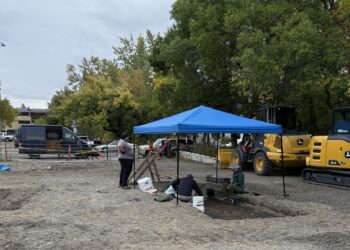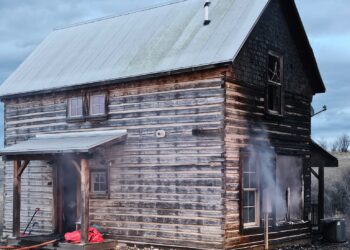By Gabrielle Gasser Explore Big Sky Cub Reporter
BIG SKY – Steve Holcomb is a successful Olympic athlete and a role model for perseverance. He was born and raised in Park City, Utah, home of one of two existing bobsled tracks in the U.S.
Initially however, Holcomb’s dream was to become an Olympic skier. He trained for a while until, following the 1998 Olympics, the U.S. bobsled team held open tryouts. He gave it a shot, and eventually qualified for the national team.
During his career as a bobsledder, Holcomb competed in many races while battling a degenerative eye disease. When his condition worsened, he underwent experimental procedures to save his vision. The procedures worked and allowed Holcomb to participate in the past two Olympic Games, bringing home a gold medal in 2010 and two bronze medals in 2014.
Explore Big Sky sat down with Holcomb during a March 21 visit to Ophir School to talk about his recent experience competing in the 2014 Olympic Winter Games in Sochi, Russia.
Explore Big Sky: Congratulations on your two bronze medals in Sochi. How did it feel being on the podium?
Steve Holcomb: It’s a pretty overwhelming feeling. I wanted to be an Olympian since I was a child and obviously the goal is to be an Olympic champion and win medals. To finally have that dream come true – it’s overwhelming, it’s really a fantastic feeling. And it’s hard to explain. It took me 16 years of bobsledding to finally reach those goals.
EBS: How did you get interested in bobsledding?
S.H.: I was born and raised in Park City, Utah, which makes it kind of easy. There are only two tracks in the entire United States. One is in Park City, and the other is in Lake Placid, New York. I kind of grew up around it a little bit. Right after the 1998 Olympics the [U.S. bobsled team] had an open tryout. I did well and then I was invited to a camp. At that camp I did well again and just slowly worked my way up.
EBS: Did you believe your bobsledding career was over when your vision started failing?
S.H.: Yeah, actually I did. I thought my vision problem was a disease that was incurable. Since then, there’s a new procedure I underwent that saved my vision. I went through a major depression because of it … just as I was getting good at what I was doing, I was watching my childhood dreams disappear. But this procedure, which has awesomely been renamed after me, Holcomb C3-R, basically stopped my vision from getting worse. Then for the second part of it they implanted contact lenses inside my eye. It saved my vision.
EBS: How did your expectations for the future change when your sight was restored?
S.H.: Having my vision restored was my first gold medal, and that was the moment I realized I could still continue doing what I love. I was just getting good at bobsledding and so I could continue down that path and I could finally, no pun intended, see my dreams to the end. It was life changing, just knowing not to give up hope and to keep going.
EBS: Did you ever think you would achieve as much as you have?
S.H.: Yes and no. I mean, I would say everybody who comes into the sport, their goal is to win a gold medal and be the best in the world… At the same time, less than one percent of all the athletes that try actually reach that goal. You have to go into it knowing that you most likely will fail, but that’s not something that should stop you. You have to know that there is that chance and if you work hard enough and do what you need to do and make the right sacrifice when you need to, it can pay off.
EBS: What has driven you to work so hard and become so successful?
S.H.: I think I just love what I do. I love bobsledding, and I was pretty good at it [and] enjoyed doing it. They always say, ‘find what you love to do, and find a way to get paid for it.’ Unfortunately, we don’t get paid for it. We’re volunteers, but at the same time I live for free at the U.S. Olympic training center: free food, housing, training facilities. I’m not getting paid, but I’m not paying to do what I love either.
EBS: Are you satisfied with your success?
S.H.: Yeah, I would’ve loved to come home with two golds or at least two silvers, but the Russians, I think, were going to win on their own track. I didn’t think we had a good shot at beating them. Then I got injured during the first day of racing. To be able to come home with two medals while being injured was a pretty cool feat.
EBS: What is your advice for aspiring Olympic athletes?
S.H.: I think the biggest thing is don’t give up. If I gave up when I first learned about my eyes, I wouldn’t be sitting here right now with three Olympic medals. There’s a great saying: ‘Tough times never last, but tough people do.’ A lot of times when things get tough, people are like, ‘Well, I’m out.’ Eventually you’ll get past that tough spot, and you’ll move on, and you’ll probably be better for it. Perseverance is the hardest part.













